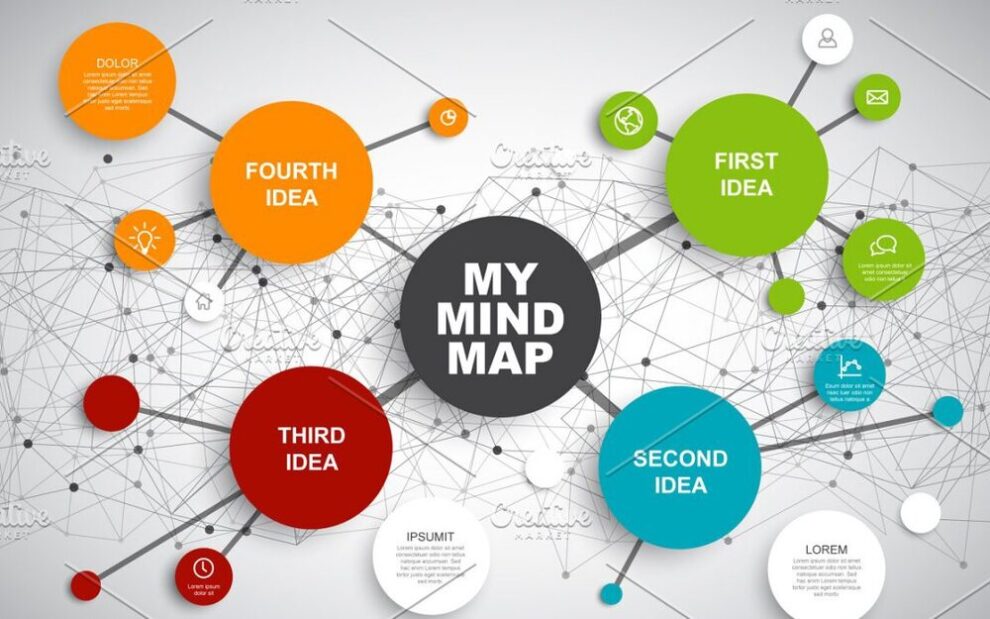Mind mapping is a productivity hack that should be more popular because of its many benefits. Even professional academic writing services students use to pay someone to write essay utilize the tool to prioritize information in students’ papers and deliver stellar results. And for people who need to retain information and recall things they’ve learned, it beats note-taking any day, any time.
But there’s a good chance that many readers only just heard of the term mind mapping and are curious about how it works and which apps support it. And that is why this article will demystify mind mapping and suggest the best mind mapping apps for learning.
What Is a Mind Map?
A mind map is a simple system that students and other learners use to represent and categorize information visually.
Many mind maps look like a 2D web of diagrams, usually showing a central theme and other secondary dependent ideas or themes. After drawing a mind map, you can analyze the information and form a visual hierarchy instead of stressing your brain to create a mental one.
How Does Mind Mapping Work?
Mind mapping takes advantage of the visual part of learning by presenting complex ideas in their rudimentary forms. It’s similar to how professional writers present students’ data to understand their essays before working on them. And if you are in search of such writers, read these WritePaper reviews to find a trustworthy writing service.
The curvilinear branches trail from a core idea and imprint the connection between that central idea and its supporting themes. When enough of such relationships have been created, you may begin to notice a pattern. These patterns and relationships will help you understand and recognize a concept irrespective of its appearance in tests and in the real world.
How Does Mind Mapping Help You Learn Better?
Thanks to the two-dimensional system in which mind maps are represented, you won’t be distracted by over-the-top graphics. Also, the ideas in each box in a mind map are simple (often one-word) keywords, which helps with retention and ensures you don’t get confused with more complex mind maps.
Focusing on the written details and their interconnectedness will help you find and fix the associations and progressions between thoughts or ideas. And mind maps that use colors also help you differentiate or group ideas based on their topics, origins, or any other classification you want.
3 Mind Mapping Apps for Learning
MindMeister
MindMeister is a mind mapping app that lets you visualize ideas, collaborate with teams, manage tasks, and share your mind map with anybody. The app motivates people to try their hands on mind mapping for the first time because its editor makes things pretty customizable.
You get mixed map layouts, custom styles, and the ability to add media to your mind map. The app is perfect for planning projects and recording ideas that pop up in a brainstorming session.
You can use it during meetings to create a schedule everyone can contribute to, allocating minutes to map topics and ensuring you don’t waste time on trivial topics or overlook major ones.
You can use the basic version of this app, which lets you create three mind maps, or pay $2.49, $4.19, and $6.29 monthly for the Personal, Pro, and Business subscriptions.
Mindomo
If you are familiar with mind mapping and don’t mind an app that is a bit complex, you should use Mindomo. Firstly, its free version is top tier compared to what you’ll get from most other apps. You can create three free mind maps and collaborate on the projects.
When you pay for a premium plan, you can embed media files to your map, sync projects in real-time, and create backups in the cloud. You can import files to make your work quicker, and exporting your mind map as an image, PDF, text, or PowerPoint file is a piece of cake.
This app suits teachers and learners and is trusted by academic institutions like UNT Health Science Center and Northwest School Division, as well as the best dissertation writing services on the market. It makes study planning easy and can even come in handy in your life and personal growth. And if you are a Project Manager, expect its online Gantt Chart to meet your expectations.
Mindomo Premium costs €5.5 monthly, the Professional subscription goes for €13.5 monthly, and the Team plan for three or more users costs €16.5 monthly.
MindNode
MindNode is native to iOS and macOS devices. Unlike many other mind mapping apps for mobile devices that are mobile-friendly web apps, this one feels fully optimized for handheld devices.
You get iCloud synchronization to ensure you don’t lose your progress. You can even work on your mind map offline, which will appeal to students who don’t always have access to WiFi or other connectivity hotspots.
The features include Quick Entry, for noting ideas on the go, Outlining, which helps you manage and structure your brainstorming sessions, and Focus Mode, for highlighting the details in your map.
You get a free editor for basic features, importing, and exporting file formats. But if you want to enjoy MindNode, subscribe at $2.49 per month or $19.99 annually, subject to slight changes depending on your country.
Conclusion
Mind mapping makes learning quicker, straightforward, and less repetitive. With the proper mind mapping tools, anyone can become more creative and build retention.
The apps in this piece are the best in their niches, appealing to users in different fields. But irrespective of which you use, expect an improvement in your planning, thinking, and productivity.



















Add Comment